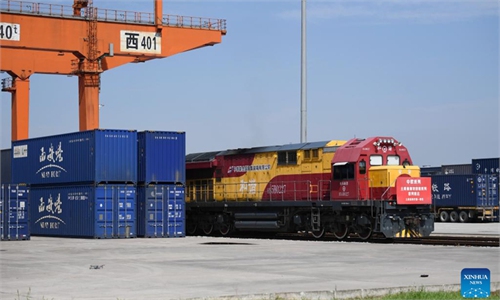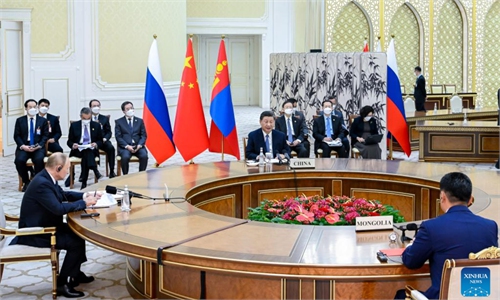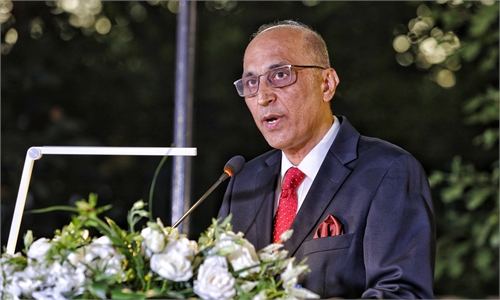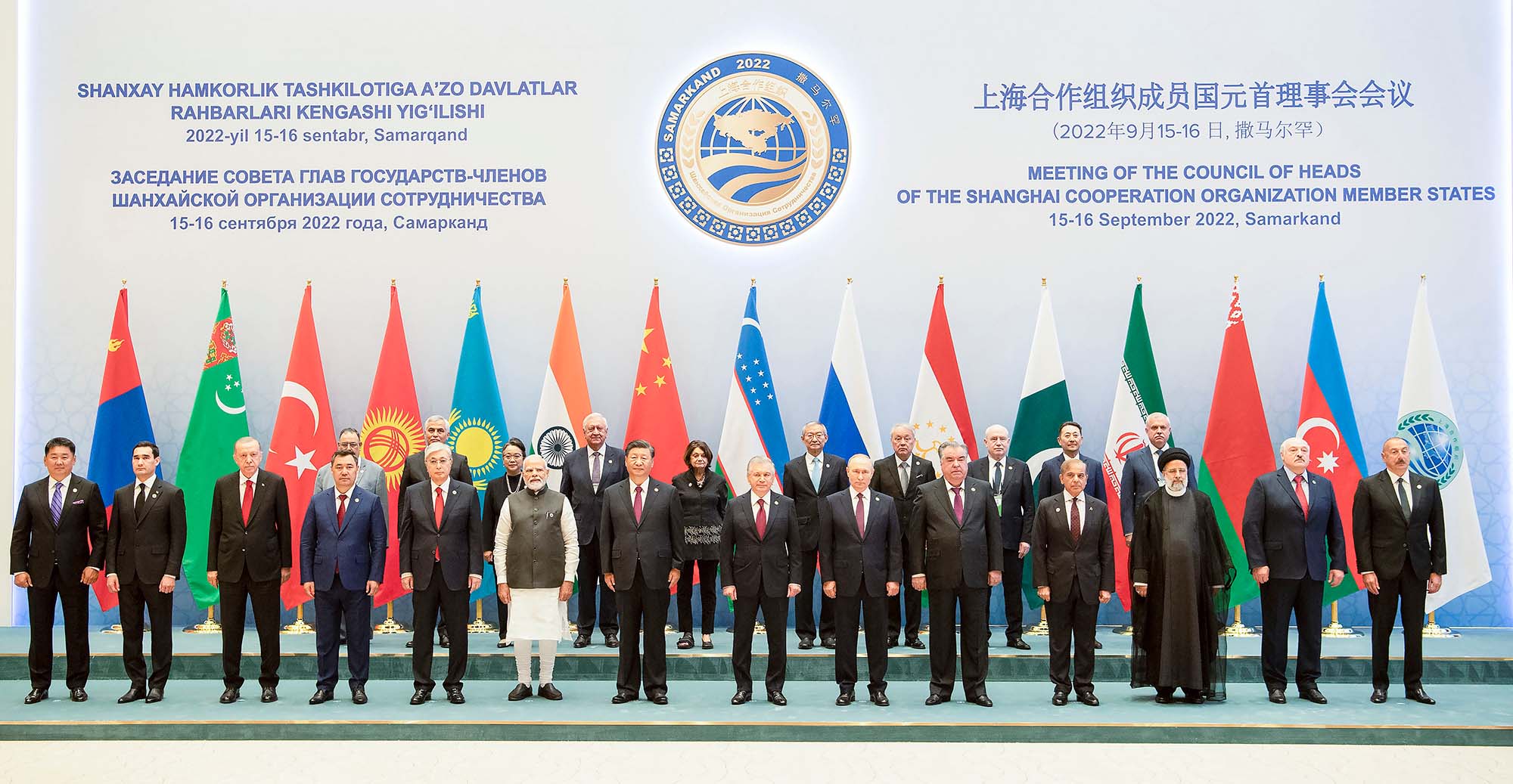
Chinese President Xi Jinping (seventh from left, front) and leaders of other Shanghai Cooperation Organization (SCO) member states, observer states and dialogue partners pose for a photo before the 22nd meeting of the Council of Heads of State of the SCO on September 16, 2022, in Samarkand, Uzbekistan. Photo: Xinhua
Chinese President Xi Jinping and other leaders of the Shanghai Cooperation Organization (SCO) member states on Friday made fruitful achievements by signing the Samarkand Declaration and a raft of documents and statements for not only regional countries but also the international community, showing the world the organization's and regional countries' joint pursuit of stability and development amid a complicated global geopolitical situation.
The prospering organization is becoming a stronger force in upholding international order by appealing to more countries to join in, and playing a more important role on the global economic stage, such as serving as a stabilizing force of international energy and food markets. The region is working closely in doubling down on efforts in fighting terrorism in this region. The SCO represents an ideal international relationship that countries have long desired, especially after the US-led unilateralism, exclusionism and forming of small cliques wreaked havoc on global stability, said experts.
President Xi on Friday attended the restricted session of the 22nd meeting of the Council of Heads of State of the SCO. While delivering a keynote speech, he pointed out that since its founding more than 20 years ago, the SCO has upheld the Shanghai Spirit and succeeded in exploring a new path for the development of international organizations.
Xi also outlined several priorities going forward for the SCO state members, including staying committed to the Shanghai Spirit and enhancing solidarity and cooperation, maintaining strategic independence and safeguarding regional stability, pursuing inclusiveness and shared benefits in promoting development cooperation, and advancing the SCO expansion process and strengthening SCO institutions.
Zhu Yongbiao, executive director of the Research Center for the Belt and Road and director of the Center for Afghanistan Studies at Lanzhou University, told the Global Times on Friday that the fruitful contents of the Samarkand Declaration showed that the SCO is marching toward becoming a more international organization from a regional organization, while its membership expands along with the member states' issues of interest.
The Shanghai Spirit upheld by the SCO members could also be applied in dealing with international issues, Zhu said.
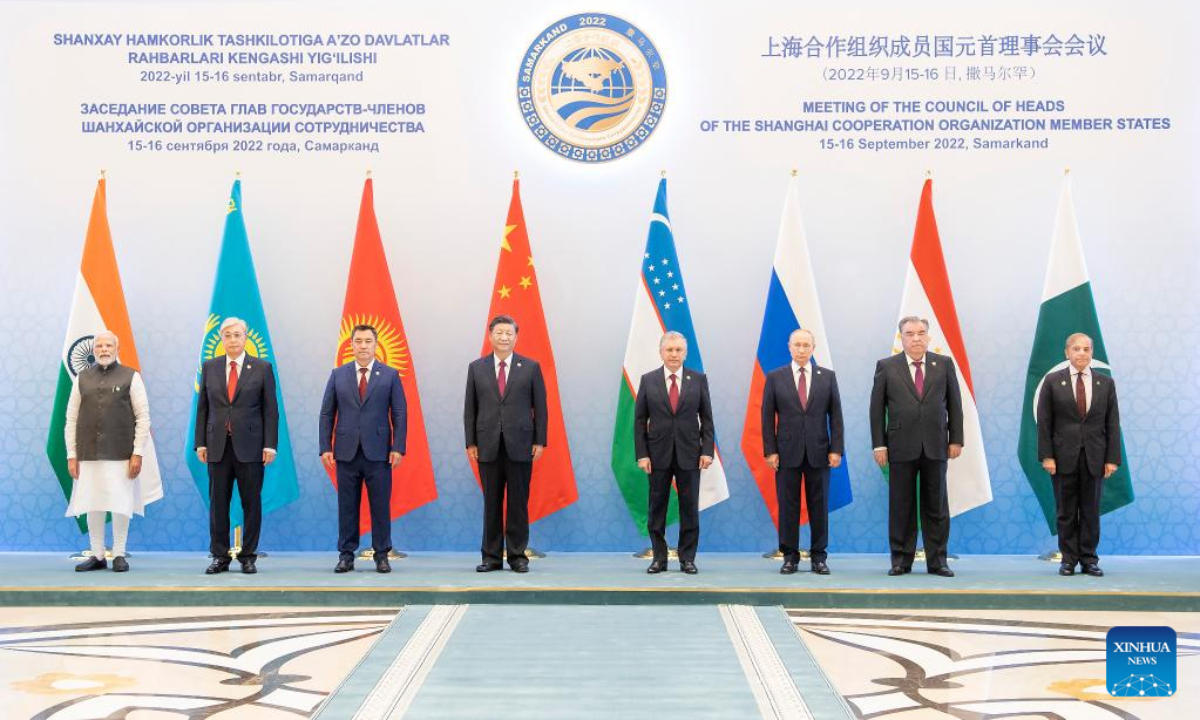
Chinese President Xi Jinping poses for a group photo with other leaders of the Shanghai Cooperation Organization (SCO) member states before the restricted session of the 22nd meeting of the Council of Heads of State of the SCO at the International Conference Center in Samarkand, Uzbekistan, Sep 16, 2022. Xi attended the restricted session on Friday. Photo:Xinhua
On Friday, SCO member states signed the Samarkand Declaration and issued statements on safeguarding global food security and energy security, addressing climate change, and maintaining a secure, stable and diversified supply chain.
Besides traditional regional security and development cooperation, the Samarkand Declaration also contained various international issues such as concern over unilateral protectionist actions that undermine the multilateral trading system. It also demonstrated that the SCO has become more mature and contributed more to the international governance system and improvement of the global order, Zhu said.
Calling for joint efforts to counter terrorism is an important part of the declaration. It noted that based on each country's laws and coordination, state members are working to form common principles and stances on creating a unified list of banning terrorist, separatist and extremist activities.
The upgrading of various anti-terrorist institutions to a comprehensive security threat center as well as joint statements on issues including food security and climate change are a natural expansion after 20 years of the organization's development, and is also a necessary move amid new security challenges facing the region, Zhu said.
The threat of the "three evil forces" has been increasing in the region with the US' reckless withdrawal from Afghanistan, external interference and political turmoil of some Central Asian countries due to various factors including color revolutions incited by the US, analysts said.
In addition to stressing joint efforts on countering terrorism, the Samarkand Declaration has also expressed member states' concerns over the security of outer space and other controversial fields.
"Member states stand for keeping outer space free from weapons of any kind and state the major importance of the unfailing implementation of the existing legal framework envisaging only the peaceful use of outer space," the document says.
The SCO's proposals on international issues have greatly boosted the UN's significance and inclusiveness, as many international mechanisms represent the will of developed countries but do not give full consideration to developing countries, according to Zhu.
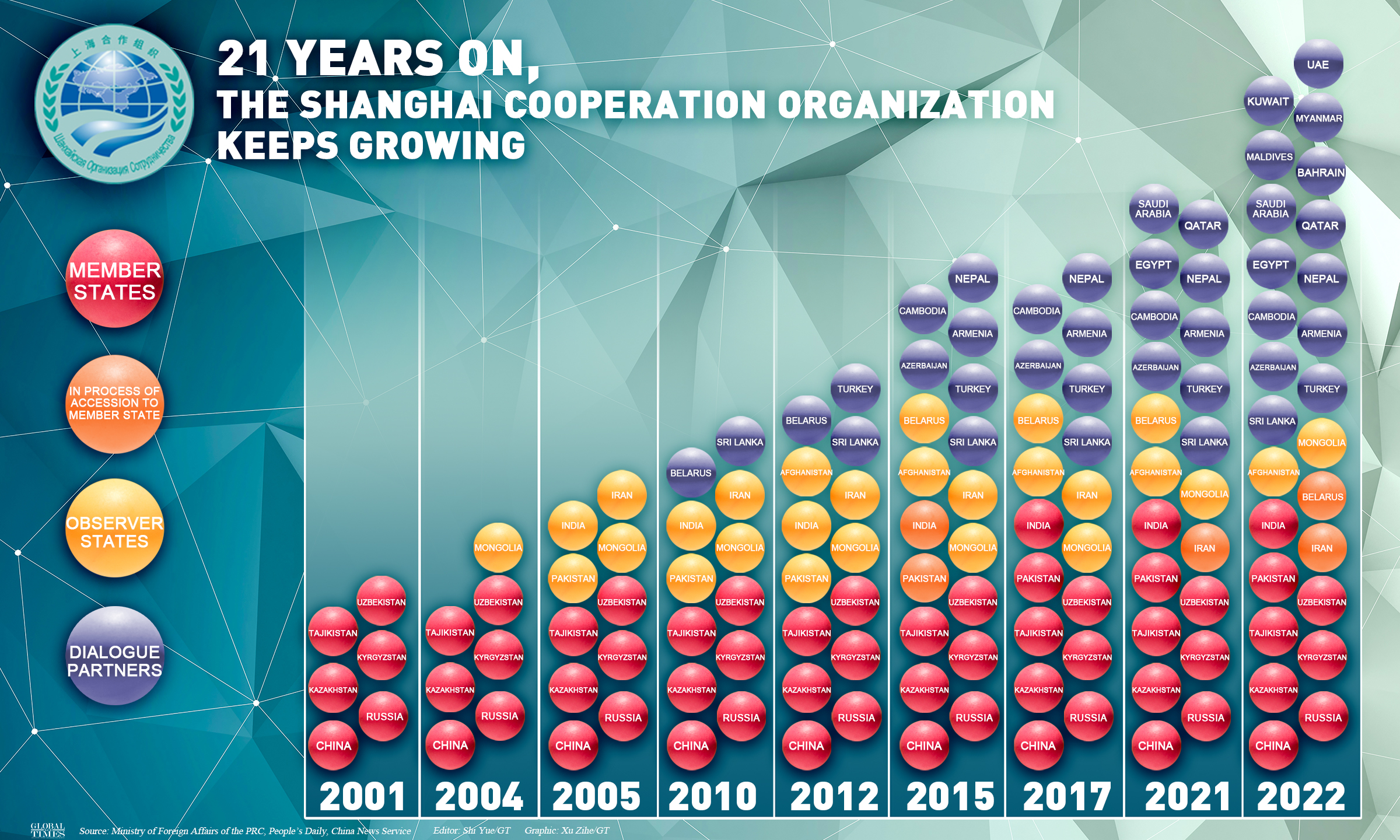
The Shanghai Cooperation Organization member states signed an MOU on including Iran as a new member and began the process to admit Belarus as a member. 21 years on, SCO, the world's largest regional organization in terms of geographic scope and population, keeps growing. Editor: Shi Yue/GT Graphic: Xu Zihe/GT
Growing bigger with a better future
One of the most important achievements reached in Samarkand is the expansion of member states. The SCO was founded with six members in 2001 and has since expanded to eight, in addition to having four observer states and six dialogue partners. On Friday, a memorandum of obligations on Iran's SCO membership was signed, and the SCO members began a process to admit Belarus to the SCO.
Saudi Arabia, Qatar and Egypt will formally become SCO dialogue partners with the signing of relevant documents, and negotiations will be held on granting Bahrain, the Maldives and other states' the status of dialogue partner.
Chinese analysts said that more countries are expected to apply to become full members of the SCO due to its growing attraction amid the West's efforts to split the world through bloc confrontation.
The attraction of SCO is that it helps member states safeguard their independence and sovereignty, provides them with broader space for cooperation, and enhances their international voice and influence. It also helps members effectively cope with changes in the international and regional situations, hedge external pressure and respond to security threats, and resolve differences through dialogue and consultation, Zhao Huirong, an Eastern European studies expert from the Chinese Academy of Social Sciences, told the Global Times on Friday.
Zhao said China and Russia, as founding members and permanent members of the UN Security Council, have an important leading role in the development of the SCO, and the two countries have common interests in promoting peace and development in the region, and putting forward many initiatives. The two countries have established a high level of strategic partnership of coordination, which to a large extent guarantees the stable development of the SCO, Zhao said.
SCO Secretary-General Zhang Ming told media recently that many other countries have also expressed the hope that they can become members, observer states or dialogue partners.
The Shanghai Spirit, which features mutual trust, mutual benefit, equality, consultation, respect for diverse civilizations, and pursuit of common development, is increasingly important in the current international environment amid hegemony and small cliques, and more countries that prefer multilateralism and peaceful development are attracted by the SCO as the organization can maintain unity and solve stability and development issues in the region, Yang Jin, an associate research fellow at the Institute of Russian, Eastern European and Central Asian Studies at the Chinese Academy of Social Sciences, told the Global Times.
Zhou Rong, a senior researcher at the Chongyang Institute for Financial Studies of the Renmin University of China, said that the SCO has evolved from an organization mainly focusing on border safety cooperation to incorporating nations from a wider geographical context.
"It will become an organization that represents the emerging nations, which will play a pivotal role in safeguarding world stability and peace," Zhou said.
